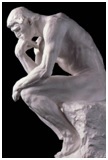|
 |
|
 |
|
|
||
St. Augustine - Philosophy, Ethics and Learning
St. Augustine (354-430)
His most famous book is... Confessions (written in 400), the world’s first autobiography.
What did he say about God, ethics and learning? 1. Nobody is perfect Admit your weaknesses and do something about them. Stand up for virtues like love, and resist the temptation of vice, although, as a youth, he asked God to “give me chastity but not yet”! As a boy he stole some pears with some friends, which taught him not to follow the crowd. Evil is “the removal of good, until finally no good remains”, he believed, and has three causes:
2. Love each other People must be:
“Love the sinner and hate the sin”, he said
3. Humility This is vital for all the other virtues like love. The more successful you become, the more humility you need. 4. Justice and hope Without justice and fairness for everyone, power is “organized robbery”. Unjust laws should be ignored. Justice needs hope, resulting from:
5. Love wisdom At the age of 18 he read a book by the Roman philosopher, Cicero (pictured right), which gave him a passion for philosophy, or the love of wisdom. He found that wisdom and happiness were not found in material possessions, but in eternal truths like God and love. It is wrong to doubt everything, because there are absolute certainties like:
He wrote about God: “Our heart is restless till it finds its rest in you”. 6. Learn continuously He learned from:
A bishop told his mother that it is best to discover things for yourself including your weaknesses and mistakes. “We learn better in a free spirit of curiosity than under fear and compulsion”, Augustine said.
7. Love God and help yourself God loves and helps you, but you must help yourself, too. “God provides the wind, but man must raise the sails”, he said. Wisdom comes from:
“The true philosopher is the lover of God”, he believed. People and countries must do anything that God wants, even if it has never been done before.
8. Believe and then understand Faith in God (believing what you don’t see) is vital to understand life and the world. Don’t try to understand first and then believe. “Believe that you may understand”, he said.
9. The 3 D’s He believed in:
Love the sinner and hate the sin Cruelty is the weapon of the powerful, used to make others fear them. Humility is the foundation of all the other virtues. Complete abstinence is easier than perfect moderation.
Key quotes on God and religion Seek not to understand that you may believe, but believe that you may understand– St. Anselm (1033-1109), Archbishop of Canterbury, said something similar. If you think you have understood God, it is not God who you have understood. God provides the wind, but man must raise the sails
Key quote on learning We learn better in a free spirit of curiosity than under fear and compulsion.
Key quote on law and justice An unjust law is no law at all.
Key quote on stress and pain Pray not for a lighter load but stronger shoulders .
Key quote on positive thinking Bad times, hard times - this is what people keep saying; but let us live well, and times shall be good.
Key quote on wisdom Patience is the companion of wisdom. |
|
|
||
|
|
||
| Copyright © wisdomtowin.com 2025 All Rights Reserved | ||
|









